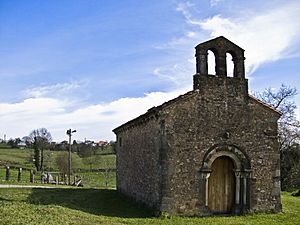Church of San Esteban de Aramil facts for kids
Quick facts for kids Church of San Esteban de Aramil |
|
|---|---|
 |
|
| Location | Asturias, |
The Church of San Esteban de Aramil (Spanish: Iglesia de San Esteban de Aramil) is a very old church located in the area of Arami, Asturias, in Spain. This church was first written about in important papers way back in 1240. It was officially recognized as a special cultural monument in 1960 because of its historical and artistic value.
Contents
History of the Church
This church was built in the Romanesque style. This was a popular way to build churches and castles between the 10th and 13th centuries. Even though we know the style, it's hard to say exactly when this church was finished.
The first time the church was mentioned in writing was in 1240. This was in documents about a gift of items to a monastery called Valdediós. The gift was made by a couple named Alvar Diaz and his wife.
There are two main ideas about how the church started. One idea is that it's the last part of an old monastery that used to be there. The other idea is that it was a church for a rich nobleman. In this case, it would have been both a private chapel for his castle and a church for the people living nearby.
Because it is so important, the church was given "Cultural Monument" status on March 23, 1960. This means it is protected by the government. The news was shared publicly on June 29, 1960.
Church Design and Decorations
The Church of San Esteban de Aramil shows many classic features of Romanesque architecture. It has a main hall, called a nave, which is shaped like a rectangle. At the southern end, it finishes with a rounded part called an apse. Many parts of the church, especially the doors and the apse, have beautiful carvings and designs.
The West Entrance
The main entrance on the western side of the church is called the West Portal. It has a rounded arch made of several layers, known as archivolts. The outside layer of this arch has a cool zigzag pattern. The inside layer is smooth and plain.
This west door has a semi-circular arch with two smaller arches. These arches rest on separate columns. Besides these columns, you can see carvings of plants and a checkered pattern all over the arches. The columns themselves have bases and tops, called capitals, that are carved with lily flowers.
The South Entrance
The entrance on the southern side is smaller but still very interesting. It looks similar in design to the western door. The South Portal also has two rounded arches. The inside arch is decorated with special scroll patterns that came from a place called Zamora. The outside arch has carvings of pointy heads that look like they are biting something. There are also round moldings showing different imaginary animals.
The Apse Window
At the back of the church, in the apse, there is a small window right in the middle. Only the top edge, called the cornice, of this window is decorated. This rounded window also has special carved supports, called corbels, and a decorative top, or canopy.
See also
 In Spanish: Iglesia de San Esteban (Aramil) para niños
In Spanish: Iglesia de San Esteban (Aramil) para niños
- Asturian art
- Catholic Church in Spain
 | Aaron Henry |
 | T. R. M. Howard |
 | Jesse Jackson |

